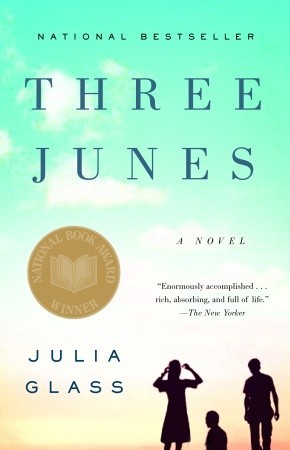Julia Glass admires Shakespeare, Pope, and George Eliot, but she says her desire to write like them is an “unrequited craving.” Right she is. Three Junes more closely resembles a novel by Jan Karon or Rosamund Pilcher, in which the sun shines, love endures, and everyone lives somewhere gorgeous, pricey, or too cute for words.
Glass, a Yale grad, painted before she became a writer. Three Junes is her debut novel. “The language part of my brain was meant to be used,” she says. “Visual art is a foreign language I’m fluent at, but my native language is language.” Her novel is written in the same pseudo-pithy tone. The first narrator, whose native language is bullshit, begins by observing:
Paul chose Greece for its predictable whiteness: the blanching heat by day, the rush of stars at night, the glint of the lime-washed houses crowding its coast. Blinding, searing, somnolent, fossilized Greece.
This florid mess is not simply the endearing overwriting of a first-time novelist. It is illogical and inaccurate. No one flips through a travel book and says, “I think I’ll go here for its predictable whiteness, and for the glint of those charming lime-washed houses on page 30.” And, unless Paul is on drugs, he probably won’t experience a “rush of stars.” How can he? He won’t be able to stay awake in the searing, somnolent countryside.
I should have realized something was wrong when I first picked up the book. The cover looks like a painting by Thomas Kinkade. An immaculate white tablecloth covers an outdoor dinner table, with thick bushes in the background and a blue sky. In the upper right-hand corner, a sticker from Good Morning America advises you to “Read This!” Remove the book jacket and recoil. The title, written in gold, loopy cursive, stretches across a bright purple binding. I wonder if Pantheon wanted to market Glass as the sort of writer whose excerpts you would read in Redbook.
After choosing Greece for its predictable whiteness, Paul, an elderly Scottish man, befriends Marjorie, one of the women in his touring group. She is a bubbly, irritating caricature who begins every other line of dialogue with the epithet, “dear one.” Later in the novel, when Paul’s son is narrating, he notices Marjorie’s letters:
We look at each other expectantly, not quite able to say good-bye. “May I ask you something else, something blunt?” my ventriloquist’s dummy utters. When she nods, I ask, “Are those love letters?”
She looks stunned, and at first I’m sure I’ve offended her. “Yes,” she says. Her eyes glitter. “Love-of-life letters. That’s what they are.”
What was her editor thinking? I won’t even get into the ventriloquist’s dummy. All of the characters—ex-barmaids and grad students alike—tend to speak as if they’re starring in an Andrew Lloyd Webber musical.
Paul and his wife raise three sons. The rebel, Fenno, narrates Part II, which is by far the longest and strongest section of the novel. Fenno clashes with his brothers as they prepare for Dad’s funeral. Throughout the cooking and decorating, he privately recalls his friendship with Mal, a snobby music critic who died of AIDS. We’re supposed to conclude that Fenno, an aloof drifter with a large inheritance, avoided emotional attachments until Mal came into his life. Fenno failed to acknowledge Mal’s love until the death scene, at which point Fenno began to engage with the world and admit to his feelings. But this trite psychological journey doesn’t interest me. I’m just happy that Fenno’s perspective isn’t entirely saccharine.
In the third section, Glass reclaims the third-person point-of-view and describes a dinner cooked by Tony, the obnoxious, thinly-drawn playboy who administered blow jobs to Fenno in Part II. Fenno, no longer involved with Tony, agrees to come to the dinner. Various unimportant characters join him. One, a woman named Fern, has also slept with the host, but she is now recovering from her husband’s accident/suicide. I doubt Glass wanted me to laugh as she described the husband’s deadly fall from a New York apartment. These characters are so two-dimensional that their tragedies are amusing.
It all ends happily as Fenno and Fern drive back to New York. They smile at each other, and Glass says that they’re thinking, “Here we are—despite the delays, the confusion, and the shadows en route—at last, or for the moment, where we always intended to be.”
Lately the popular way to explain a sappy novel’s success is to invoke our post-9/11 need to feel good about ourselves. Hence the best-seller status of Anna Quindlen’s Blessings, Ann Packer’s The Dive from Clausen’s Pier, and Alice Sebold’s The Lovely Bones. Amazon lists all of these titles among the books you should read if you love Three Junes. But America has always enjoyed sentimental crap. Anna Quindlen was writing uplifting tear-jerkers long before the collapse of the World Trade Center. And Glass hasn’t been successful in the bookstores; at least not as successful as Quindlen, Sebold, and Packer. The real question is why Three Junes won the National Book Award.
I can only speculate that it was better than the other short-listed contenders. This is the case with Adam Haslett’s You Are Not a Stranger Here, a collection of shallow, melodramatic short stories. I haven’t read the three remaining selections, but I struggle to believe that each is inferior to Glass’s debut. And I suspect that stronger novels—Bel Canto, The Crimson Petal and the White—were overlooked. Recalling the allusions to `cranial balls,’ `languorous pauses,’ and `sensual sorts of coup de foudre,’ I must shrug in bewildered defeat. Glass’s critical success is the greatest literary mystery of 2002.

